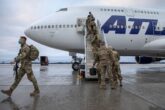December 07, 2010
Responsible Transition: Securing U.S. Interests in Afghanistan Beyond 2011
The summer of 2011, when U.S. troops will begin to draw down in Afghanistan, will mark a watershed in the U.S. and NATO's decade-long effort in the country. A second watershed will occur in 2014 when the United States and NATO will transfer full responsibility of their efforts to Afghan leadership. But how does the United States and its allies get there from here? And what should the U.S. role be in Afghanistan beyond 2014?
Responsible Transition: Securing U.S. Interests in Afghanistan Beyond 2011, authored by CNAS Senior Advisor and Senior Fellow Lieutenant General David Barno and Fellow Andrew Exum, lays out a strategy for the post-July 2011 phase of U.S. and NATO efforts in Afghanistan, defines the U.S. troop presence and commitment beyond 2014, and offers operational and strategic guidance for protecting U.S. and allied long-term interests in Afghanistan and Pakistan.
More from CNAS
-
A Failure to Plan: Examining the Biden Administration’s Preparation for the Afghanistan Withdrawal
Afghanistan, Iraq, and Vietnam. One failure is a horrible accident; two failures are a tragic coincidence; three failures are a disturbing trend that shows the U.S. government...
By Christopher D. Kolenda
-
Against All Odds
Eighteen months after taking power, the Taliban is intensifying its repression of Afghan civil society and cracking down on the rights and freedoms of all Afghans, especially ...
By Lisa Curtis, Annie Pforzheimer & Jan Mohammad Jahid
-
To Help Afghanistan, Engage Its Political Opposition
The effort to help Afghans shape a better alternative should begin now....
By Richard Fontaine & Lisa Curtis
-
International Community Must Do More to Protect Human Rights in Afghanistan
Human rights in Afghanistan, especially those of women and girls, have deteriorated sharply during the first year of Taliban rule. The very real prospect of losing a generatio...
By Lisa Curtis, Annie Pforzheimer & Jan Mohammad Jahid



